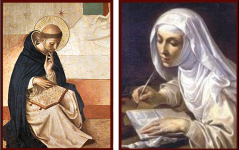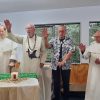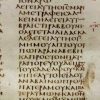Year A | The third week of Advent
A reflection from Pat Neuwelt – Preparing the way for Jesus
Isaiah 35:1-6.10; James 5:7-10; Matthew 11:2-11
Normally when we prepare for something, we get busy ticking off the many tasks on our to-do lists. At this time of year, with not only Christmas but summer holidays approaching, the to-do list can become a bit overwhelming! The readings for the 3rd Sunday of Advent readings point us towards a very different understanding of preparation.
In Matthew’s gospel story we learn that John-the-Baptist is in prison, where he’s having a crisis of faith. From the setting of a prison cell, it’s not surprising that he’s beginning to doubt whether he’s made a serious error of judgment regarding Jesus’ messianic status! So he sends his followers to ask Jesus for reassurance. Rather than judge John as ‘weak’, Jesus sends John’s followers back with stories of ‘the stirrings of the Spirit’ in the world (healing and new life), to encourage John in his struggle. And, remarkably, he then publicly proclaims his utmost respect and deep love for John as not only a Prophet, but as ‘the greatest among those ever born of women’.
What happens next is highly significant. Just in case anyone had put John on a pedestal in their mind’s-eye, Jesus tells the people, “Yet the least in the kingdom of heaven is greater than he.” In other words, in the eyes of God, no one is greater than another.
So what does this have to do with preparation for the coming of Jesus, the Christ? On a pedestal, John could not have effectively prepared the way for Jesus. In fact, he has to step aside (even be imprisoned!) for Jesus to be recognized by others. John teaches us that we, too, are called to be contemplatives and prophets – which involve ‘stepping aside for Jesus’. We’re called to let go of our need to be noticed, to be successful, to be ‘the best’, etc – or, as Richard Rohr and Cynthia Bourgeault argue in their many beautiful writings, we are called to be less ego-driven and to operate from a more unitive place…the place deep within that knows that we are not separate from God. From that place of knowing, we can ‘announce’ (through every fiber of our being and every moment of our lives) that Jesus is not only coming but that he is, in fact, here.
We can live out of the knowledge that Jesus is always coming…every moment of every day Jesus is coming. He comes into the world through every sunset, every raindrop, every bird that sings, every cloud that passes overhead…. He comes through every child born, every spring, every new day… Jesus comes through the stranger on the bus, the disenfranchised young person in the park, the taxi-driver (who happens to be a highly qualified professional from a far-off place!). He comes through the chaos of family life, through the moments of utter loneliness, through the suffering and death of a loved one… Jesus comes through every expression of compassion, no matter how small.
How, then, might we ‘prepare’ this Advent? In my experience, the highlights of each day tend not to relate to my to-do list! The greatest moments seem to have little to do with how well prepared I am for anything. Instead, the best moments are the daily, unexpected encounters with ‘the coming Jesus’, for which the only preparation can ever really be ‘an openness of heart’.
Let’s open ourselves more deeply, letting go of our to-do lists…and revel in the daily comings of Jesus into our lives, into our world. Let us be an Advent people.
_____________________________________________________________________________________________________________________________________
Year A | The second week of Advent
A reflection from Sr Margaret Butler op
Isaiah 11:1-10; Romans 15:4-9; Matthew 3:1-12
Earlier this year I read an article about repentance. Like many people I cannot remember the author. While ‘remembering’ is a key part of the Christian message it does not always flow over into everyday life!
The author enjoyed exploring the meaning of ‘repentance’ and noticed that there seems to be some connection with the English word ‘pensive’ or thoughtful. The connection is tenuous at best but I have spent some good time using the insight. If there is a connection then ‘to repent’ could mean ‘to think again’. While respecting the traditional meaning of repentance, concerning a change of heart, I have found a great richness in exploring areas of my life that need rethinking.
As we journey through Advent, preparing again for the coming of the Messiah and hearing the message of John the Baptist, I choose to rethink the culture of this country which concentrates on the secular celebration of summer, holidays and consumerism. I also look at the situation in the Middle East, especially in Syria, and rethink how the relationships could be between and among peoples in our time. I look at the lack of respect for human beings in this country and rethink how we can address the number of child abuse cases, sex scandals, the financial manipulation of the poor, the elderly, the poorly paid and those who lose jobs for reasons beyond their control. I hear some of our politicians telling us that the economy is going well while hundreds of jobs are disappearing and I remind myself to rethink my own attitudes and behavior. I look at life in and on this planet and know that I need to rethink the way I live.
There is a lot of rethinking to be done by us all, gospel people and others!
At times all this thinking becomes too much and I find myself looking helplessly at everything around me and wondering where I can go to from here. Indeed, where can we locally and globally turn to as we strive to change attitudes and behaviours? The extract from Romans that is proclaimed at Eucharist today speaks loudly and with great encouragement to this situation: May he who helps us when we refuse to give up, help you all to be tolerant with each other, following the example of Christ Jesus…… (Rom 15:5).
All three readings challenge us to rethink our lives. We are called to think beyond ourselves, beyond our own world view. This is a huge change of heart, a major repentance for our self-centeredness. Isaiah shows us the vision of pairing with the other: wolf and lamb, panther and kid, calf and lion cub, cow and bear, infant and cobra’s hole. I talk a lot about looking out for the other in my neighbourhood but I am one of the fastest to retreat when the other is too challenging, too demanding, or too different. The advent message reminds me again to look beyond, to be tolerant, to listen to learn and to grow.
The Pharisees and Sadducees are reminded by John the Baptist that it is not enough for them to be descendants of Abraham, and Paul reminds the Romans that the message is for the pagans, the others, as well. As a young person I lived in a Catholic enclave, surrounded by a largely Presbyterian/Anglican population. I was a teenager before I met someone who did not speak English. Now that I am in the golden years I am surrounded by a secular society, many different languages and many varied customs. It is not enough for me to be satisfied with being Catholic and of Anglo-Irish descent. To live enriched by the hope promised in the readings I need to learn from the other, reach out to the other, and relate with the other as did Jesus, the face of God who loves us all.
Will you join me on this Advent journey?
[Scroll down to see the Advent Reflection for Week 1]
________________________________________________________________________
Year A | The first week of Advent
A reflection from Mike Kelly
Readings: Isaiah 2:1-5 | Romans 13:11-14 | Matt 24:37-44
In some ways I think Advent is a more meaningful season than Lent, because it leads us up to that extraordinary moment when the divine became human, and gave human beings like you and me the potential to reach for the divine. And what a gift that is, to people struggling with the tribulations of merely human life.
Today we read of Isaiah’s people, 750 years before Christ, lacking a focus in life and constantly facing the tragedies of war. The recipients of Paul’s letter, mainly slaves and migrants in Rome, lived in poverty, surrounded by a society that sneered at those trying to live a life of holiness. Both Isaiah and Paul offer the people hope – Isaiah talks of “the days to come” and the Lord’s mountain. Paul emphasises that “salvation is near”. The important thing, for both Isaiah’s and Paul’s communities, is that they do not just wait passively, but that they take action NOW. Now is the time to start climbing the mountain, now is the time to put on the Lord Jesus Christ.
In Matthew’s gospel, Jesus stresses the urgency of the task. Be alert to the will of God in our world. NOW, NOW is the time to act.
As we begin this season featuring tired carols and commercial trivia, we too need to take some action. We can reach out, find and share meaning in our lives in the face of so much confusion and sadness. What is there in my world that calls urgently to me? Is it a foodbank dealing with ever-increasing poverty? An environment under threat of contamination? Or Caritas which skilfully combines helping those in need and raising the cry of justice?
NOW, NOW is the time.
Image: We thank Mary Horn op for sharing this lovely image “Hope Within Us” for reflection during Advent.
REFLECTION FOR SECOND SUNDAY OF ADVENT YEAR A
Isaiah 11:1-10; Romans 15:4-9; Matthew 3:1-12
Earlier this year I read an article about repentance. Like many people I cannot remember the author. While ‘remembering’ is a key part of the Christian message it does not always flow over into everyday life!
The author enjoyed exploring the meaning of ‘repentance’ and noticed that there seems to be some connection with the English word ‘pensive’ or thoughtful. The connection is tenuous at best but I have spent some good time using the insight. If there is a connection then ‘to repent’ could mean ‘to think again’. While respecting the traditional meaning of repentance, concerning a change of heart, I have found a great richness in exploring areas of my life that need rethinking.
As we journey through Advent, preparing again for the coming of the Messiah and hearing the message of John the Baptist, I choose to rethink the culture of this country which concentrates on the secular celebration of summer, holidays and consumerism. I also look at the situation in the Middle East, especially in Syria, and rethink how the relationships could be between and among peoples in our time. I look at the lack of respect for human beings in this country and rethink how we can address the number of child abuse cases, sex scandals, the financial manipulation of the poor, the elderly, the poorly paid and those who lose jobs for reasons beyond their control. I hear some of our politicians telling us that the economy is going well while hundreds of jobs are disappearing and I remind myself to rethink my own attitudes and behavior. I look at life in and on this planet and know that I need to rethink the way I live.
There is a lot of rethinking to be done by us all, gospel people and others!
At times all this thinking becomes too much and I find myself looking helplessly at everything around me and wondering where I can go to from here. Indeed, where can we locally and globally turn to as we strive to change attitudes and behaviours? The extract from Romans that is proclaimed at Eucharist today speaks loudly and with great encouragement to this situation: May he who helps us when we refuse to give up, help you all to be tolerant with each other, following the example of Christ Jesus…… (Rom 15:5).
All three readings challenge us to rethink our lives. We are called to think beyond ourselves, beyond our own world view. This is a huge change of heart, a major repentance for our self-centeredness. Isaiah shows us the vision of pairing with the other: wolf and lamb, panther and kid, calf and lion cub, cow and bear, infant and cobra’s hole. I talk a lot about looking out for the other in my neighbourhood but I am one of the fastest to retreat when the other is too challenging, too demanding, or too different. The advent message reminds me again to look beyond, to be tolerant, to listen to learn and to grow.
The Pharisees and Sadducees are reminded by John the Baptist that it is not enough for them to be descendants of Abraham, and Paul reminds the Romans that the message is for the pagans, the others, as well. As a young person I lived in a Catholic enclave, surrounded by a largely Presbyterian/Anglican population. I was a teenager before I met someone who did not speak English. Now that I am in the golden years I am surrounded by a secular society, many different languages and many varied customs. It is not enough for me to be satisfied with being Catholic and of Anglo-Irish descent. To live enriched by the hope promised in the readings I need to learn from the other, reach out to the other, learn from the other, and relate with the other as did Jesus, the face of God who loves us all.
Will you join me on this Advent journey?








